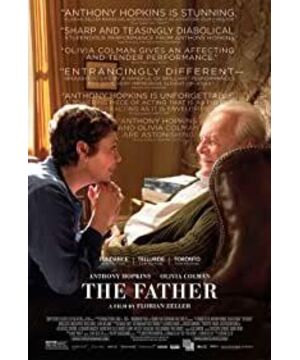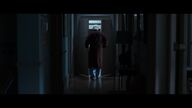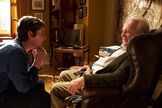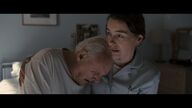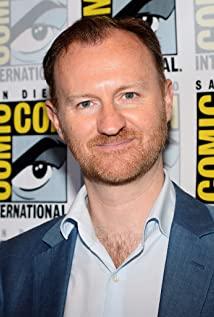Today I will talk about a movie that is currently being screened-" Father Trapped in Time ".
At the most recent Oscar, the film was nominated for 6 major awards including best picture, best actor, best actress, best adapted screenplay, best editing, and best art direction.
In the end, the 84-year-old veteran Antonio Hopkins won the title of actor for the second time with the film.
There is no doubt that Father Hopkins' performance is impeccable. But compared with it, what is more worth mentioning is the outstanding contribution made by the director of this work in the process of transition from stage play to film. In this article, I want to talk to you about this topic: what is the decisive factor in the achievement of this movie.
01
The film "Father Trapped in Time" is adapted from the stage play of the same name.
The setting of this stage play is extremely simple, all relying on the performances and lines of the actors to lay out the plot. So before watching the movie, I was worried that it was just a translation and rehearsal of the stage play, but after watching it, I found that this kind of worry was unnecessary.
The director of the film-and the author of the stage play, Florian Zeller, was called "the most exciting playwright of our time" by the British "Guardian", and in this film, he proved with practical actions that he is also A director with great potential. this
This potential is reflected in the fact that he is very aware of the advantages of the film in his heart, and has the ability to make full use of this advantage, so that the original excellent drama can be presented more accurately and more three-dimensionally.
So what are the advantages of movies?
Summarize in one sentence: Realize the restoration of material reality with more complex scene scheduling.
From this perspective, what this movie shows us is precisely the characteristics of the film as a medium.
From the first act of the film, the advantages of the film are being used.
In the picture, the eldest daughter Anne was on her way. She crossed the streets and intersections and walked towards her father's house. At this time, the background music was playing the opera "King Arthur". We originally thought this was a piece of "passive music", but when Annie saw her father, his father took off the headphones and the music disappeared. We realized that this piece of music came from father Anthony's mind.
Don't underestimate this schedule. Although it is just a simple "parallel narrative of sound and picture", it is an effect that can only be achieved by the medium of "movie".
At the same time, it is also an invitation, inviting us to walk into Anthony's subjective world.
Anthony in the film is an 84-year-old man who unfortunately suffers from Alzheimer's disease. His memory began to be blurred and confused, and his life fell apart.
And this movie takes us through Anthony's "illness" from the first perspective, experiencing his panic, helplessness and loneliness.
In this sense, it is very similar to a VR movie about Alzheimer's disease. The director uses the powerful audiovisual capabilities of the film to let us start from the real experience and achieve the ultimate empathy and care.
02
The typical symptom of Alzheimer's disease is " memory disorder ", which is a mixture of amnesia, dislocation and delusion.
How to construct such a distorted spiritual world?
The director established three major variables-space, characters and events, and finally realized the presentation of "chaotic memory" through repeated transformations and combinations between the three major variables.
Let's talk about them one by one, let's talk about " space " first .
Three spaces have appeared in the film, namely: father Anthony's home, daughter Anne's home, and nursing home.
These three spaces are linked together by Anthony's trajectory. As his condition continued to worsen, he moved from his home to his daughter's house, and finally lived in a nursing home.
If you don't look closely, these three spaces are very easy to confuse, because they are too similar . The layout is almost the same whether the hall, living room, corridor or bedroom.
Let's take the corridors and bedrooms as examples.
This is the corridor and bedroom of father Anthony's house:
This is the corridor and bedroom of the daughter Anne's house:
This is the corridor and bedroom of the nursing home:
It is precisely because of this similarity that the film escapes from a single space and time, and instead travels freely in three spaces, creating an erratic sense of freedom.
The most impressive are two places.
In one place, Anthony angrily walked through the "home corridor" and entered the bedroom, but a closer look would reveal that he actually completed a crossing and walked into the "daughter Anne's bedroom".
The other is in the second half of the film. As Anthony's illness worsens, the three spaces penetrate and overlap each other more and more.
First, the painting hanging in the living room suddenly disappeared.
The painting was originally hung at Anthony's house, but its disappearance at this time means that his memory of his own family has begun to be indifferent.
In addition to the objects that disappeared suddenly, there are also some more furnishings in the house out of thin air-chairs.
Where did they come from?
If you pay attention, you will know that they actually belong to nursing homes.
Through these highly recognizable objects, the director shows us the process of Anthony's memory fade, that is, his own objects gradually disappear, and the objects of the nursing home begin to invade and cover the old memories.
Or put it another way, the whole movie can be regarded as Anthony's "cranial theater", which is his memories in the nursing home. So, whether his home or his daughter's home is actually constructed from the memories of the nursing home, they are so similar. In the end, the memories of the distant past will fade away, leaving only the lonely and cold life in the nursing home.
Just as the vibrant paintings hanging in the living room will eventually be replaced by boring TV sets.
03
The chaotic time and space are only the stage of memories, and the protagonist is the two variables to be said next: characters and events . Anthony's memories are actually not complicated at all. He is nothing more than entangled with a few people who hurt his heart, and a few things that make him worry about it. Specifically, there are three:
First, the death of the youngest daughter Lucy;
Second, the eldest daughter Annie abandoned him;
Third, the abuse by a certain man.
In the last days of his life, his consciousness was completely occupied by these three things, but due to the decline of his memory, everyone and everything was fragmented, so he was stuck in it and it was difficult to get out.
First of all, Anthony has never been able to accept the fact that his youngest daughter Lucy has died.
So, in his living room, he has been hanging Lucy's painting, even if he moved to Anne's house, this painting still reappears in his memory.
He would constantly mistake the nanny and caregiver for Lucy.
He also often talked about Lucy's special title for him-"Little Daddy". And when Annie called him this way, it was difficult for us to tell whether it was a mistake that he remembered; or he wanted to hear the title so much that he asked Annie to call him like this in his mind.
Secondly, Anthony could not accept the departure of his eldest daughter Anne.
Annie wants to follow her lover to live in Paris. She cannot take care of her sick father, so she has to send him to a nursing home. For Anthony, this is a helpless and cruel thing.
So in his memory, he kept repeating the process of Anne abandoning him. This process was always accompanied by the sad melody of "She seems to be in the flowers" in the first act of the opera "The Pearl Plier".
This melody has appeared three times, and the accompanying plot is: Annie calls the nursing home to make an appointment, Annie takes her father to the nursing home, and Annie bids farewell to her father. It just happened to string up the whole process of Annie's departure.
Even more heartbreaking is that in order to refuse to accept this fact, Anthony subconsciously tampered with the logic of memory. He forgot about Annie's departure, and only clearly remembered the reason why she would not leave. This reason was actually far-fetched. It was the phrase he repeatedly said: "The French don't even speak English. "
And deep in the subconscious, Anthony also hides more complicated emotions towards his eldest daughter.
This complexity is presented through memories that are difficult to distinguish between true and false twice.
Once, the daughter walked into the bedroom and leaned over and strangled his neck; once, the daughter sat in front of the bed and stroked his face.
The former is a delusion, the latter is an expectation. They may not really happen, but at the same time they constitute Anthony's fear and love for his eldest daughter.
Apart from worrying about his daughter, there is another thing that makes Anthony feel uneasy, that is , a man has abused him.
As for who it was, Anthony has no idea.
However, it is speculated from the plot that the most likely person should be Bill, a male nurse in a nursing home with a smirk. So in his memory, Anthony constantly replaced this face that frightened him with people he hated. Including: Anne's ex-husband James, who has been divorced for many years, and Anne's current lover Paul.
And behind this unconscious replacement, there is another layer of Anthony's thoughts hidden. As a father, he certainly hopes that his daughter will have a good home, but on the other hand, he doesn't want her daughter to leave, so he can't help but develop an idea: If the person your daughter falls in love with is a wicked person, how good it would be, then maybe the daughter might Will not leave.
04
It is precisely through the above three variables: space, characters, and events that the film constructs Anthony's chaotic spiritual world.
In each scene, some or all of the variables have changed, perhaps due to spatial confusion, perhaps the character being crowned and worn, or perhaps the event repeats itself in a different way, from which we perceive Anthony—the Artz The helplessness and pain of the elderly with Haimer disease.
In addition, the film also uses a large number of images and props to metaphor the situation of the elderly.
For example, " water flow ".
Soon after the film began, there was an empty shot of the water flowing in the kitchen.
And when Anthony was about to be sent to a nursing home in the second half of the film, the camera shot the tap again with the same composition, at which time the water flow had become water droplets.
That symbolizes that Anthony's memory and even his life are almost dried up.
Another example is " clothes ".
In the first half of the film, Anthony wore very decent clothes, such as suits, shirts, and sweaters.
In the twenty minutes towards the end of the film, he put on his pajamas, and that pajamas looked like a "patient gown."
This actually also implies that Anthony is already a patient at this time, and his glorious memories of the past have gradually faded away.
In addition, a more obvious image is " watch ".
From beginning to end, Anthony was looking for his watch. The meaning behind it could not be clearer. He was a person who was trapped in time, lost his memory coordinates, and lost himself.
At the end of the film, when he was admitted to a nursing home and his memory was gone, he cried and said to the nurse: "I have no place to live, but I know that my watch is still on my wrist."
After the camera changed, the nurse took his hand, and we saw that his wrist was actually empty.
At this time Anthony has completely lost time, so much so that he has forgotten even losing himself.
As he himself said: "I feel that my leaves are about to fall out."
That was the most touching monologue in the movie I've seen this year.
It speaks of the grief when life is about to die, and at the same time, in a poetic tone, it tells another form of "death": in fact, losing memory is equivalent to death.
Because the so-called "me" is the sum of "my memories".
05
If there are any problems with this movie, I think there are two.
One is the small structure . But strictly speaking, this is not a problem, it is just the director's personal choice.
Second, there is confusion in some perspectives . Especially in the middle part, there are several times when the narrative is carried out from the perspective of the eldest daughter Anne. This is undoubtedly a kind of destruction for a movie that tries to create a closed and self-consistent spiritual world for the protagonist Anthony.
If the film can stick to Anthony's perspective from beginning to end, the audience's sense of substitution will be stronger and the entire immersive experience will be more complete.
Nevertheless, I still approve of this movie.
It can be said that it created a template to the movie theater transplant , at the same time, it also did not wreck the actor's charm, but by means of audio-visual language to make plays and performances will be bonus.
In fact, no matter how successful the previous work is, whether it is a drama, a TV series, a game or a variety show, since you decide to make a movie, you must follow the laws of film art.
Unfortunately, this simple truth is not understood by every creator.
Welcome to pay attention to my public account: Zi Ge said the movie
Only write different in-depth film reviews.
View more about The Father reviews


